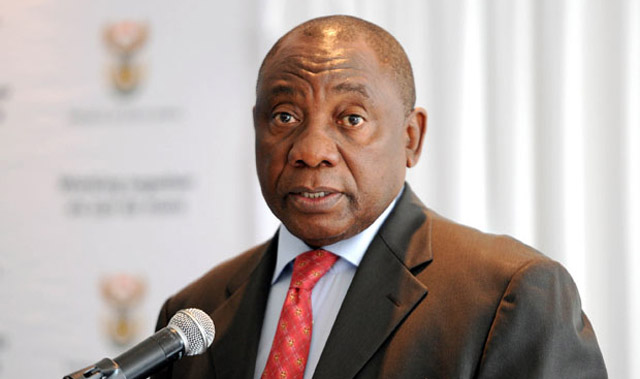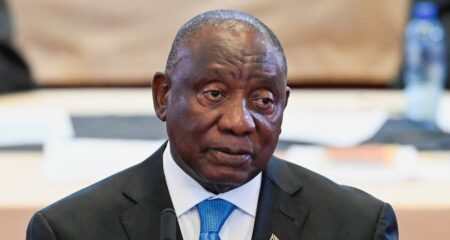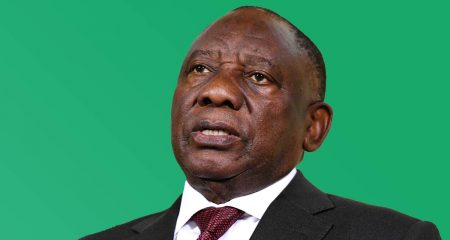
Deputy President Cyril Ramaphosa has taken the gloves off in the contest to become South Africa’s next leader, delivering a scathing speech criticising “the rot” and widespread patronage plaguing the ANC.
Ramaphosa stopped short of openly declaring his candidacy to succeed President Jacob Zuma, 75, in a speech on Sunday, but his address left no doubt that his campaign is now firmly under way.
He made several thinly veiled attacks on Zuma, who’s indicated that he’s backing his ex-wife and mother of four of his children, Nkosazana Dlamini-Zuma, for the top post.
Dlamini-Zuma, who’s spent the past few weeks traversing the country drumming up support while guarded by the presidential protection unit, took an early edge in the race to succeed Zuma as ANC leader in December while Ramaphosa had run a subdued campaign, said Ralph Mathekga, an analyst at the Mapungubwe Institute for Strategic Reflection, a Johannesburg-based research group.
“It’s becoming clear that he wants the position of party president,” Mathekga said. “He’s become more decisive and could inflict damage to the campaign of Zuma’s preferred candidate.”
A lawyer who co-founded the National Union of Mineworkers, Ramaphosa, 64, helped negotiate a peaceful end to apartheid and draft South Africa’s first democratic constitution. He lost out to Thabo Mbeki in the contest to succeed Nelson Mandela as president in 1999 and went into business, securing control of the McDonald’s franchise in South Africa and amassing a fortune before returning to full-time politics in 2012 as the ANC’s deputy leader.
Appointed as the nation’s deputy president in 2014, Ramaphosa has spent much of his tenure defending the ANC and government in the face of a series of scandals implicating Zuma. He publicly disagreed with his boss for the first time this month after Zuma fired Pravin Gordhan as finance minister, prompting S&P Global Ratings and Fitch Ratings to downgrade the country’s credit rating to junk.
In his speech delivered at a memorial service for the late South African Communist Party leader Chris Hani, Ramaphosa backed a recommendation by the former graft ombudsman that a judicial commission investigate if members of the Gupta family, who are friends with the president and are in business with his son, unduly benefited from state contracts and tried to influence cabinet appointments. Zuma and the Guptas have denied wrongdoing.
“The allegations that there are private individuals who exercise undue influence over state appointments and procurement decisions should be a matter of grave concern to the movement,” Ramaphosa said. “These practices threaten the integrity of the state, undermine our economic progress and diminish our ability to change the lives of the poor.”
ANC rules discourage members from openly lobbying for leadership posts, and say they should await nomination from its branches before declaring their availability. Several senior party leaders have called for the regulations to be changed.

“We know those are ‘pretend rules’ and nobody actually plays by them,” said Susan Booysen, a professor at the University of the Witwatersrand’s School of Governance. “The rules are there to protect the incumbent and their chosen successor.”
The ANC has won more than 60% of the vote in every national election since it took power in the first multiracial one in 1994, placing its next leader in pole position to become the nation’s next president in 2019 when Zuma is due to step down. The party will hold its internal elections at a 16-20 December conference in Johannesburg.
Anger, disappointment
“Ramaphosa realises that this is the moment to come out because there is general support for him and it comes in the context of anger and disappointment and people wondering why on earth he has not come out to declare his candidacy,” Booysen said.
Ronnie Mamoepa, Ramaphosa’s spokesman, said he couldn’t comment on party matters.
Dlamini-Zuma, 68, had an early edge in the succession battle, according to 11 of 26 analysts surveyed by Bloomberg on 13 and 14 February, while 10 put Ramaphosa ahead, and five said the contest was too early to select a front-runner.
Ramaphosa still faces major obstacles in his bid for the ANC’s top job. While he’s received the support of the main labour federation, Dlamini-Zuma has the public backing of the ANC Women’s League and part of the party youth league, and can expect the endorsement of three premiers of three rural provinces known as the “premier league” who are allied to Zuma.
There was a public uproar in 2012 when Ramaphosa made a failed R19,5m bid for a buffalo cow and calf at a game auction, a move opposition parties said was scandalous given the country’s enduring poverty.
The killing of 34 protesters by police at Lonmin’s Marikana platinum mine in 2012 following days of violent strike action also dented Ramaphosa’s image. While he called the labour action “dastardly criminal” in an e-mail a day before shooting and urged police to take “concomitant action”, a commission of inquiry cleared him of wrongdoing. A company he led had a stake in the mine.
Under Zuma, the ANC suffered its worst electoral performance since the end of apartheid in municipal elections in August, losing control of Pretoria and Johannesburg.
While Ramaphosa still needs to build his support base, the fact that he’s made it clear he’s in the race, should bolster his chances, according to Mathekga.
“People can see he is a real option,” he said. — (c) 2017 Bloomberg LP




